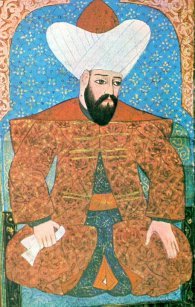| Orhan | |
|---|---|
| Ghazi | |
 16th century Ottoman miniature of Orhan Ghazi | |
| Sultan of the Ottoman Empire (Padishah) | |
| Reign | 1323/4–1362 |
| Predecessor | Osman I |
| Successor | Murad I |
| Born | Unknown |
| Died | March 1362 Bursa, Ottoman Beylik |
| Burial | Osmangazi, Bursa, Turkey |
| Consorts | Asporça Hatun Nilüfer Hatun Theodora Hatun Others |
| Issue Among others | Süleyman Pasha Murad I Halil Bey |
| Dynasty | Ottoman |
| Father | Osman I |
| Mother | Malhun Hatun (possibly)[1] |
| Religion | Islam |
| Tughra |  |
Orhan Ghazi (Ottoman Turkish: اورخان غازی; Turkish: Orhan Gazi, also spelled Orkhan; died 1362) was the second sultan of the Ottoman Empire from 1323/4 to 1362. He was born in Söğüt, as the son of Osman I.
In the early stages of his reign, Orhan focused his energies on conquering most of northwestern Anatolia. The majority of these areas were under Byzantine rule and he won his first battle at Pelekanon against the Byzantine Emperor Andronikos III Palaiologos. Orhan also occupied the lands of the Karasids of Balıkesir and the Ahis of Ankara.
A series of civil wars surrounding the ascension of the nine-year-old Byzantine emperor John V Palaiologos greatly benefited Orhan.[citation needed] In the Byzantine civil war of 1341–1347, the regent John VI Kantakouzenos married his daughter Theodora to Orhan and employed Ottoman warriors against the rival forces of the empress dowager, allowing them to loot Thrace. In the Byzantine civil war of 1352–1357, Kantakouzenos used Ottoman forces against John V, granting them the use of a European fortress at Çimpe around 1352.[2][3] A major earthquake devastated Gallipoli (modern Gelibolu) two years later, after which Orhan's son, Süleyman Pasha, occupied the town, giving the Ottomans a strong bridgehead into mainland Europe.
According to Muslim scholar Ibn Battuta, Orhan was "the greatest of the Turcoman kings and the richest in wealth, lands, and military forces".[4]

- ^ Feridun Emecen (1988–2016). "Mal Hatun". TDV Encyclopedia of Islam (44+2 vols.) (in Turkish). Istanbul: Turkiye Diyanet Foundation, Centre for Islamic Studies.
- ^ Nicolle, David and Hook, Adam. Ottoman Fortifications 1300–1710. Osprey Publishing, 2010. page 8 Retrieved 3 Sep 2011.
- ^ Goffman, Daniel. The Ottoman Empire and Early Modern Europe. Cambridge University Press, 2002. page 42 Retrieved 3 September 2011.
- ^ Henry Glassie (1991). Turkish Traditional Art Today. p. 370.